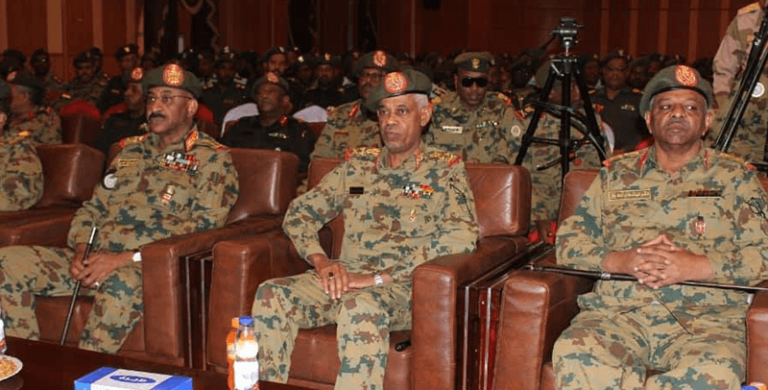
Sudan’s military institution has just deposed the country’s long-ruling president Omar al-Bashir after months of continued popular protests and agitations for change. The move comes less than a month after the Algerian military decided to withdraw its support from Algeria’s octogenarian President Abdelaziz Bouteflika and allowed for a transfer of power to Speaker of Parliament Abdelqader Bensalah who will lead a 90-day transition period. In both cases, the generals appear to think that they can lead an orderly transition to a multiparty democracy, which was the major demand of millions of Sudanese and Algerians, along with calls for socioeconomic change, ending corruption, and good governance. Yet in both cases, caution should be in order: the military brass removing Bashir today served him well in his autocracy while Algeria’s officers were important pillars of the so-called pouvoir (power) of that country’s regime.
It is an article of faith that the position of the armed forces in the Arab world is the pivotal and deciding factor determining the outcome of popular agitations for change from authoritarian rule. In the post-2011 period, only the Tunisian military, and because of structural conditions relating to its generally apolitical nature, remained outside the fray, thus allowing for a good transition led and implemented by civilian political forces in the country. Today, and despite serious economic troubles, Tunisia’s transition stands as the only case of a successful procedural change from the autocracy of a police state to the democracy engendered by elite compromise.
On the opposite end stand such dismal records as those of the Egyptian, Syrian, Yemeni, and Libyan armed forces, each guilty of subverting the will of protesters and demonstrators demanding structural change in entrenched authoritarian regimes. In all of these cases, the military rushed to preserve its version of the Arab state it led for decades, unencumbered by visions of withdrawal from politics. In one––Egypt’s––the military gradually stripped hope from the forces of change in society and ended up staging a bloody coup that reestablished the status quo ante. In three––Syria’s, Yemen’s, and Libya’s––the military led a process of systematic destruction of the physical edifices of their states to protect authoritarianism and prevent change.
Indeed, rare have been the occasions when the military brass in the Arab world implemented what the people wanted. Such an occasion occurred in none other than Sudan when Field Marshall Abdel-Rahman Suwar al-Dahab staged a military coup against dictator Jaafar al-Nimeiri in 1985, but soon allowed for a transition to civilian rule and parliamentary democracy. That democracy was deposed by Omar al-Bashir in 1989 with the assistance of today’s leader of the army putsch General Awad Ibn Auf, who was Bashir’s vice president and Minister of Defense. It is thus legitimate to ask about the agenda and possible trajectory of the declared military council in Khartoum and the two-year transitional period that Ibn Auf declared following the army’s move.
In the army’s statement that Ibn Auf read on Sudanese television, the officers committed to a number of declarations about removing old regime stalwarts, releasing political prisoners, fighting corruption, writing a new constitution, and allowing for free and fair elections after two years, among other things. But these commitments appear to fall short of the public demands that have animated Sudan’s streets since last December. Indeed, protesters were quick to reject what they called a ‘military coup’ and the army’s decision to anoint itself the leader of the coming period. Instead, protesters are planning to remain in the street and are demanding a transitional period of four years led by technocratic civilians who prepare the country for an open democratic change. This is a stark difference between old regime elites, specifically military officers, and the coalition of civilian democracy-demanding crowds of individuals and professional unionists and activists who do not seem to trust the military to lead Sudan after it drove it into the mud for the last three decades.
Omar al-Bashir’s regime and his military have no good record to support the army’s current stand on changing Sudan’s politics, and it is thus dangerous that the coup leaders remain in charge of a purported period of transition. Ibn Auf himself was instrumental in Bashir’s rise in 1989 and has remained at his side since, ending up as his vice president and defense minister in the end. Over the decades, Bashir, Ibn Auf, and their military elite and supporters in the deposed president’s National Congress Party have presided over the gradual and slow collapse of the country.
Sudan is gripped by corruption and nepotism and its economy is teetering. Khartoum recruited thugs and militias for a campaign of ethnic cleansing and human rights violations in Darfur, earning Bashir an indictment from the International Criminal Court. In 2011, following decades of civil war and destruction of the south, South Sudan broke away and established itself an independent state. Since 2011 and the loss of major revenue streams from oil from the south, Bashir has presided over a shrinking economic pie that finally led to unending protests and demonstrations that prompted his ouster.
Bashir’s departure from the scene should not be understood as the panacea that will save Sudan from the dismal record of failures over which he presided. And he was not alone; the high ranks in the military institution are as guilty of his transgressions and letdowns. Only their removal en masse from their positions of authority today will help guarantee that the collapse of the edifices of repression, corruption, and authoritarianism is possible. In fact, militarism in Sudan has been a bane to its development and only a return to its rich civilian cadres of politicians and experts will help it surmount the many obstacles the high brass has erected on the way.

